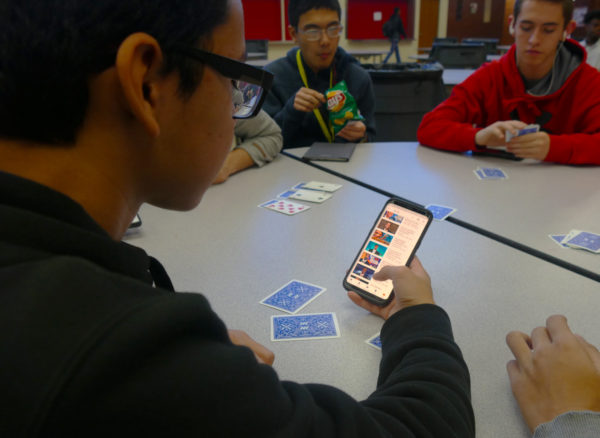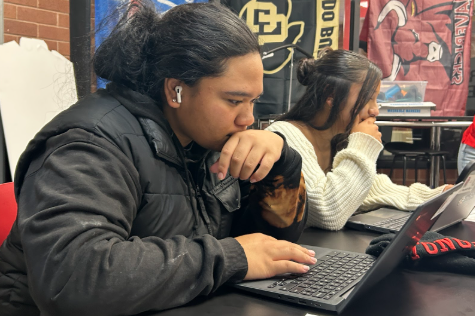Feature Photo By: Sam Newman – Junior Jordan Alvarenga browses YouTube while playing cards with seniors Matthew Oda (left) and Tyler Cella (right). YouTube is one of over one billion websites on the Internet protected by net neutrality.
What if you had to pay extra to use Google, or to watch a video on YouTube, or to read a news story? What if you could not look up any articles written with a liberal bias because the provider of your Internet was conservative? What if you could not buy anything from Amazon because eBay was paying your provider more?
What if, by the end of the year, all of these things could become possible?
On Thursday, December 14th, the FCC decided to overturn net neutrality in a 3-2 vote, repealing the 2015 rules and laws for the regulation of the Internet. Ajit Pai and two other Republican commissioners voted to abolish net neutrality, while the two Democrats voted to keep it.
In a speech before the vote, Pai stated that, “We are helping consumers and promoting competition. Broadband providers will have more incentive to build networks, especially to underserved areas.”
You may have heard in the past week or two lots of discussion about net neutrality, especially used as a political term. This is not just at Rangeview, or even in Colorado. Across the United States and across the Internet, discussion of net neutrality has erupted following an announcement by FCC chairman Ajit Pai on Tuesday, November 28th:
“Until 2015, the FCC treated high-speed Internet access as a lightly-regulated ‘information service’… A few years ago, the Obama Administration instructed the FCC to change course. And it did, on a party-line vote in 2015; it classified Internet access as a heavily-regulated ‘telecommunications service,’” Pai stated. “If the plan is adopted on December 14, we’ll simply reverse the FCC’s 2015 decision and go back to the pre-2015 Title I framework.”
You can read Pai’s full speech here.
What Pai and the FCC intend to do is to remove the federal regulations that currently keep the Internet neutral. Despite being the primary users of the Internet, not all teenagers understand the exact implications of this. But before you can begin to understand what the FCC’s announcement means, an understanding of net neutrality itself might be beneficial.
What Is Net Neutrality?
The dictionary definition of net neutrality is as follows:
- Net Neutrality (n): the concept that broadband Internet service providers should provide nondiscriminatory access to Internet content, platforms, etc., and should not manipulate the transfer of data regardless of its source or destination.
But what, exactly, does that mean? To begin, what is an Internet service provider? An Internet service provider is a company who provides Internet access to citizens of the world. Comcast, Verizon, and AT&T are all Internet service providers, or ISPs. There are over 2,500 ISPs in the United States.
The central idea behind net neutrality is that these companies — these Internet service providers — cannot change what is seen on the Internet, cannot change what is sent on the Internet, and cannot manipulate what is sent or received over the Internet in any way. According to net neutrality, the only role ISPs should play is actually providing people with unfiltered Internet.
In the words of Randy Mills, Rangeview’s head of technology, “The value of net neutrality is that it gives an even playing field to every citizen by not allowing companies to gouge consumers.”
Net Neutrality in the Past
The Internet today came into existence in 1990. For twenty-five years, the Internet was essentially unregulated by the government; as long as Internet content stayed within legal limits, the government stayed out of it. Then, on March 12, 2015, the FCC (Federal Communication Commission) released an Open Internet Order. The 400-page report by the FCC detailed strict rules to maintain the net neutrality of the Internet. You can read the full report and order here.
In summary, the new rules made it so that Internet service providers could not manipulate the data shown on the Internet in any way. They had to fairly display all legal material, with none of their own bias. In essence, the FCC made the Internet a means for the free sharing of information. It was an extension of Freedom of Speech to the modern era.
Net Neutrality Now
In May of 2017, the FCC began to work on assessing and possibly withdrawing their 2015 laws and regulations. You can read the FCC’s explanation and defense of their possible decision here. To sum it up, the FCC believes that their 2015 rules were an example of “heavy-handed Internet regulation,” which put unnecessary red tape on a major economic benefit to the nation. By rolling back their 2015 policies, they hope that the Internet will become more laissez-faire, as it was before the 2015 regulations.

The laissez-faire theory in terms of the Internet suggests that, if the government stays out of the way of Internet companies as much as possible, the Internet will develop more effectively and efficiently than it would under federal control. The FCC hopes that, by lifting their regulations on the ISPs, the Internet’s infrastructure will be expanded to more rural areas, and it will continue to grow at a high-speed rate. Theoretically, should the laissez-faire concept work out, the Internet service providers would be forced to stay fair to their consumers in order to remain competitive with other ISPs. As to whether that will or will not happen, we will soon find out.
What It Could Mean
So what? Why should teenagers who do not seem to have much political power care? If net neutrality is revoked, there may be some significant and noticeable differences in general Internet usage. Should net neutrality come to an end, there will no longer be restrictions on how ISPs run their companies, or how they interact with their customers.
The removal of net neutrality would allow for ISPs to change the Internet that is viewed by their customers so that it is favorable to them. This could include them only displaying websites that agree with their political interests, or charging extra for certain services, or favoring one website over another because of payments.
To help understand the implications of this a bit more, picture yourself talking on the telephone with Pizza Hut, trying to order a pizza. Suddenly, your call is cut off, not by a failure in the telephone lines, or by a mispressed button. Rather, it is your phone company that cut off the call. Why? Because Little Caesar’s pays the phone company to redirect potential customers.
Phone companies cannot do this now because they are treated as ‘common carriers’ under federal law, so they have to treat all traffic equally. At the moment, parallel laws apply to the Internet, but those are the laws that the FCC are trying to abandon.
Furthermore, the expulsion of net neutrality would allow Internet service providers to have a greater income, at the expense of our own wallets. While ISPs can charge however much they want for general Internet usage, that is all they can charge for; once you pay for access to the Internet, you have access to everything. With the abolition of net neutrality, Internet service providers would be able to charge extra for access to websites.
To put this in perspective, imagine having to buy different packages to use different services. For example, ISPs could charge extra for a search engine package that includes Google, Bing, and Yahoo; they could then sell a separate streaming package, which would allow you access to Netflix, Hulu Plus, and Amazon Prime Video (you would still have to pay money to these services after buying the package). The revocation of net neutrality could put the Internet more on the level of TV, in that providers can control what stations or websites you have access to.
As junior Kenny Luong put it, “This is one of those company-based things, where companies are trying to make money off of the middle class, like usual. It’s bad for us, because of our socioeconomic class.”
What Can You Do?
Now you’ve read about some of the things that can happen to your Internet; you know about how your Internet might become restricted, and how your Internet could become an even bigger source of income for Internet service providers. What can you do about it?
You can make your voice heard. No, you cannot vote with the FCC on the matter, nor can you single-handedly bring down the plan to end net neutrality. But if you raise your voice, and the man next to you raises his, and the woman next to him raises hers, the FCC might just take note.
There have been outbursts against Ajit Pai across the Internet as people work to be heard. There have been petitions circulated, funds raised, and protests made. Just use your free Internet to google ‘net neutrality’; you will find that the front page has many websites that describe how some people are making their voices heard.
“I already called my chairman and put in my refusal of it,” said senior Kyle Lawson. “That’s one way. You can go to this website and call one of your chairmen from Colorado, to put in a word that, ‘I don’t want this to happen.’”
You can find the phone numbers and emails of Colorado Senators and Representatives here. Use this link to get in touch with a Coloradan Representative to inform them to take action, making your voice heard.






